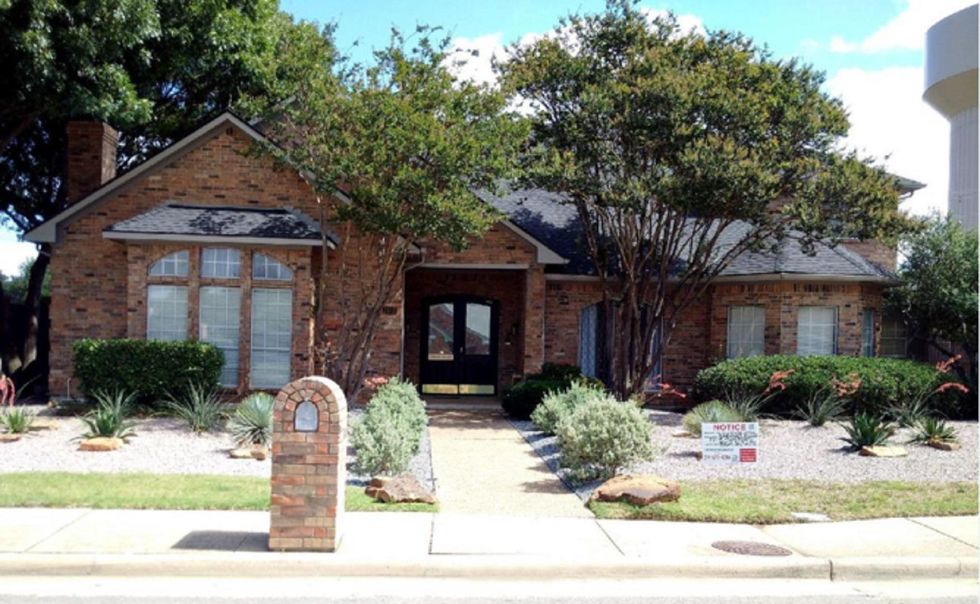
Congregation Toras Chaim has filed a lawsuit against the city of Dallas, citing religious discrimination. (Congregation Toras Chaim courtesy photo made available to the media by First Liberty)

Congregation Toras Chaim has spent about five years in a legal battle with the city of Dallas over parking ordinances. The city is refusing to give the synagogue a variance to a law on how many parking spaces it’s required to have – even though the Orthodox congregation does not drive on days when the building is at maximum capacity.
Now the congregation is fighting back, filing a lawsuit of its own and accusing the city of infringing on its religious freedom.
Congregation Toras Chaim is located in a residential area in Far North Dallas. This is not unusual for a Jewish congregation. Because of laws regarding the Sabbath, Orthodox Jews are not allowed to drive, ride in a car, or walk more than a set distance on Saturday, so their meeting places need to be within their own neighborhoods.
According to the congregation's lawsuit, 25 congregants regularly gather there on Saturdays, while a smaller number gathers there throughout the week.
The city of Dallas has so far refused to give the synagogue a parking variance. Without the variance, the congregation would be forced to move since their lot does not allow them to add the required number of parking spaces.
Because the congregation has to be able to walk to their synagogue, if Toras Chaim was forced to move, the people who go there would have to sell their houses and relocate.
Congregation Toras Chaim was founded in 2007 by Rabbi Yaakov Rich as a Jewish community focused on the Ohr HaTorah Shul outlook of Orthodox Judaism. This is only practiced by one other synagogue in Dallas.
Everything seemed to go fine for the congregation for the next five years. The Homeowners Association was aware that the building was being used as a synagogue, but raised no objections to it.
In 2013, the congregation moved to another, slightly larger, house within the same community.
A neighbor who had just moved into a house across the street from the congregation noticed the amount of people routinely visiting the congregation's building, and worried that it might impact the resale value of his new home. So he went to the HOA board to protest. When the HOA board did not share his enthusiasm for forcing the congregation out, he worked on forcing some of its members out.
According to The Dallas Observer, the neighbor's hostile actions drove the HOA's treasurer to quit and leave the area. The treasurer said that one of the things that pushed him to move was an email that this neighbor had sent questioning the "intelligence and integrity" of the HOA's president, a "kindly older lady."
The neighbor posted flyers around the community accusing the HOA of mismanagment, and managed to get himself and some other residents who agreed with him elected to the association.
That same neighbor filed a lawsuit against the congregation, but a Collin County District Court judge ruled against the neighbor, on the grounds that it violated the Texas Religious Freedom Restoration Act.
Weeks after this lawsuit was dismissed, the city of Dallas filed its own lawsuit against the congregation, claiming that it was violating parking ordinances.
The congregation sits at the entrance to a cul-de-sac, and is bordered by roads on three sides, with a long alley or driveway separating it from the next house on the remaining side.
Dallas law requires a congregation of this size to have 13 parking spaces and one handicap parking space.
However, the size and shape of the lot makes this impossible. In an attempt to comply, the synagogue made a deal with a nearby Jewish school to use six of the school's parking spaces. An additional six cars can park on the lot behind the congregation's building, but under city guidelines these do not count toward the 13 spaces required.
According to the lawsuit filed by the city of Dallas, the congregation would have to pay $1,000 per day per violation.
On May 3, with the help of lawyers at First Liberty Institute, the congregation sued the city of Dallas for religious discrimination.
In the suit, the congregation requested that the court “issue a writ of certiorari, issue a temporary restraining order to prevent enforcement of an unlawful decision, hold an evidentiary hearing, and reverse the Dallas Board of Adjustment’s...decision to deny a parking variance to CTC. Petitioners also seek declaratory and injunctive relief to prevent additional attempts by the City of Dallas to impose a substantial burden on CTC’s religious practices through unlawful enforcement of code provisions.”
David Schneider, the neighbor who filed the lawsuit against Toras Chaim, told CBN News that he thought the congregation's presence on the residential street was a real problem.
"They do services two times a day, seven times a week," he said. "So, they're a very active congregation, which is wonderful, but that also means a lot of foot traffic, a lot of car traffic."
Schneider said he wasn’t opposed to the congregation, just the traffic. He said that he had offered a $1,500 reward to find the person who painted a swastika on Rabbi Yaakov Rich's car.
But not all of Toras Chaim’s neighbors want the congregation to leave.
“There are members of the neighborhood who are supportive of CTC,” First Liberty Institute lawyer Chelsey Youman, who is representing the congregation, told TheBlaze. “But, they expressed fear of retaliation from the hostile neighbors if they came forward to support CTC.”
Youman added that Congregation Toras Chaim was not the only Jewish congregation facing these types of issues.
“Many congregations across the country are facing similar issues. Some of them even choose to meet ‘underground’ to avoid government obstruction,” Youman said.
TheBlaze reached out to the Dallas City Attorney’s office for comment, but so far has not received a response.